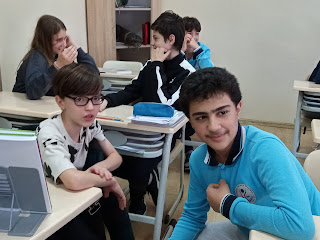Fulbright Update:
Even at young age, kids regularly exposed to hate speech
We know that kids are exposed to hate speech. Still, it’s
jarring to hear them talk about it.
At the Orizont Lyceum recently, I discussed the nature of
hate speech, and how to mitigate it, with two classes—one 7th grade, and other
5th grade.
 |
| Student discussion: Is it hate speech? |
factor.” (UN).
We also discussed whether the following example
constitutes hate speech:
“Valeriu and Ana are science lab partners. After school,
Ana sees a posted message online from Valeriu that says, ‘My lab results are
Ana are not correct. Girls are so dumb at science.’” We agreed that this is
hate speech that stereotypes girls, although a few of the boys used the example
to have some fun at the expense of their female classmates. (“Are we sure
that’s not true,” several boys said, laughing, knowing that it is certainly
not.)
Then, the students shared many examples of hate speech
that they’ve encountered online, especially on social media and on gaming
platforms. This speech included racist and sexist comments, hateful comments
directed at Russian speakers, and denigrating language overall.
We also discussed the motives behind hate speech. The
students were right on target when they cited jealousy, anger, hatred, and
wanting to get attention as motivations behind such speech.
The students had fun with the exercise I gave them. In
groups of 2 or 3, they discussed whether some example statements were or were
not hate speech, and why. We all agreed that such statements as “All Roma are
thieves,” “Girls aren’t as smart as boys in math,” and “Wives should obey their
husbands” are clearly denigrating and possibly hate speech. They weren’t so sure about statements like
“President Biden is a bad president” and “Moldova shouldn’t join the EU.” I opined
that neither is hate speech in my view since they are political statements
stated neutrally. Now, if the statement was, “Biden is a bad president because
he is too old, and old people aren’t smart or alert enough to be president,”
then that would constitute hate speech.
 |
| Fifth graders, Orizont school |
It was wonderful being back at Orizont. (See blog about my previous visit). I love the kids, and the time I spend with them is fun, energizing, and gratifying. I can’t wait for my next visit.
No comments:
Post a Comment